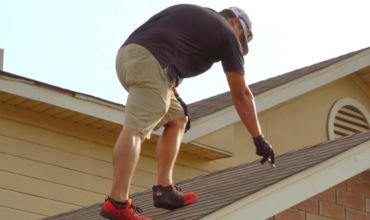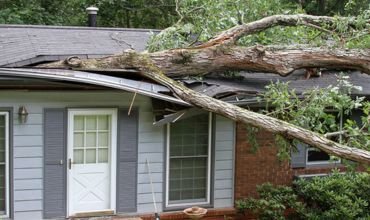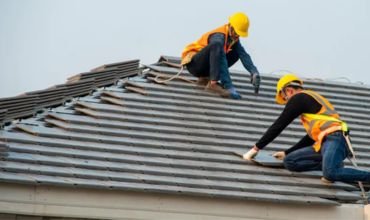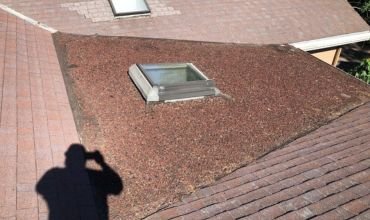We all have noticed the increasing number of scams in every field. Regarding home repairs, roofing scams are among the most common and costly types of fraud. Scammers often target vulnerable homeowners, especially after storms, when people are desperate to repair or replace their roofs. While most roofing contractors are reputable, it’s important to understand how to spot a scam and avoid becoming a victim. We at ManageMyRoof have been installing and fixing roofs throughout the Southeast for thirty years. We want to help you be alert about your home because we have heard the terrifying stories of families who scammers have conned!
Here are the things you can do to avoid the ongoing roofing scam.

One of the easiest ways to get fooled is through door-to-door roofing scams.
These individuals often knock on doors after a storm, offering free roof inspections or claiming to have noticed damage in your area.
Red flags:
Tip: Always research any contractor that approaches you unsolicited. A legitimate roofer will have references, a business license, and insurance.
Scammers frequently offer to repair “storm damage” at a minimal cost following significant weather events. They might even say they are affiliated with your insurance provider. Homeowners are left with damaged roofs and no recourse when these contractors demand payment upfront and never finish the job.

Red flags:
Tip: Get at least three estimates from licensed contractors and check their credentials with your local Better Business Bureau (BBB).
A roofer is likely a scammer if they give you an absurdly low quote for a complete roof replacement or repair. They might attempt to persuade you that they can save you money by offering “discounted rates,” but this typically results in subpar work, unstated costs, or unfinished projects.
Red flags:
Tip: Trust your instincts. If something seems too good to be true, it probably is. Get multiple quotes, and don’t be afraid to ask detailed questions about the scope of the work.
Homeowners have no recourse if the job is done incorrectly or is left unfinished because some scammers don’t have a set business address or license. These contractors frequently complete the job, collect your money, and then vanish.

Red flags:
Tip: Always work with contractors with a physical address, business license, and insurance. Ask for their credentials before signing anything.
The best definition of a genuine roofing Company is one that stands behind its back, providing a warranty and guarantee for the customers by providing both materials and labor. Scammers, conversely, may offer vague or nonexistent warranties that are impossible to claim.
Red flags:
Tip: Get any warranties or guarantees in writing and ensure they are valid for a reasonable time.
As you have read about what kind of scams can take place with you, including roof inspection scams, let’s get into how you can protect yourself from getting scammed by these fake roof inspectors:
Before jumping to the conclusion of choosing the company you will be getting for a roof inspection, make sure to read and compare all the guidelines and learn the market prices on the internet. Look for reviews, ratings, and complaints through the reputable sites.
The best advice is to never settle for the first estimate. Get at least three quotes from licensed, insured contractors so that you can left with at least 1 to 2 extra options and avoid panicking at the end moment.

After deciding on the roof fixing company, compare everything and carefully review the terms of any contract before signing. Ensure everything, including price, scope of work, and timeline, is laid out.
Ask for proof of insurance, licenses, and bonding. A reputable roofer will have these documents ready, so don’t be fooled by excuses and words.
Don’t be afraid to ask for and check references from previous customers. Some official websites also include genuine customer reviews, which can help protect against such scams.
Although roof scams constitute a significant issue, you can safeguard yourself and make sure your roofing project is successful by doing your research. Only trust trustworthy, licensed contractors with your house, and be wary of lowball offers and high-pressure sales techniques. Report any suspected scams to the Better Business Bureau or your local consumer protection organization. Both your house and your pocketbook will appreciate it!
They either propose to mend their roofs and demand a particular amount of money upfront, never undertake the work, or do it poorly and might not complete the job, deceiving homeowners into thinking their roofs are more damaged than that.
The most frequent roofing scams include “fly-by-night” contractors without a permanent office, contractors who demand significant upfront payments, and door-to-door salespeople who offer unsolicited “free inspections.”
Steer clear of making a sizable down payment upfront. Generally, trustworthy contractors don’t demand large advance payments. It’s a warning sign if a contractor requests one.
Yes. Ensure any warranty is clearly written. Be wary if no warranty is offered.
Homeowners are desperate to fix the damage quickly, making them more vulnerable to high-pressure tactics and fake offers.
Leave a Reply